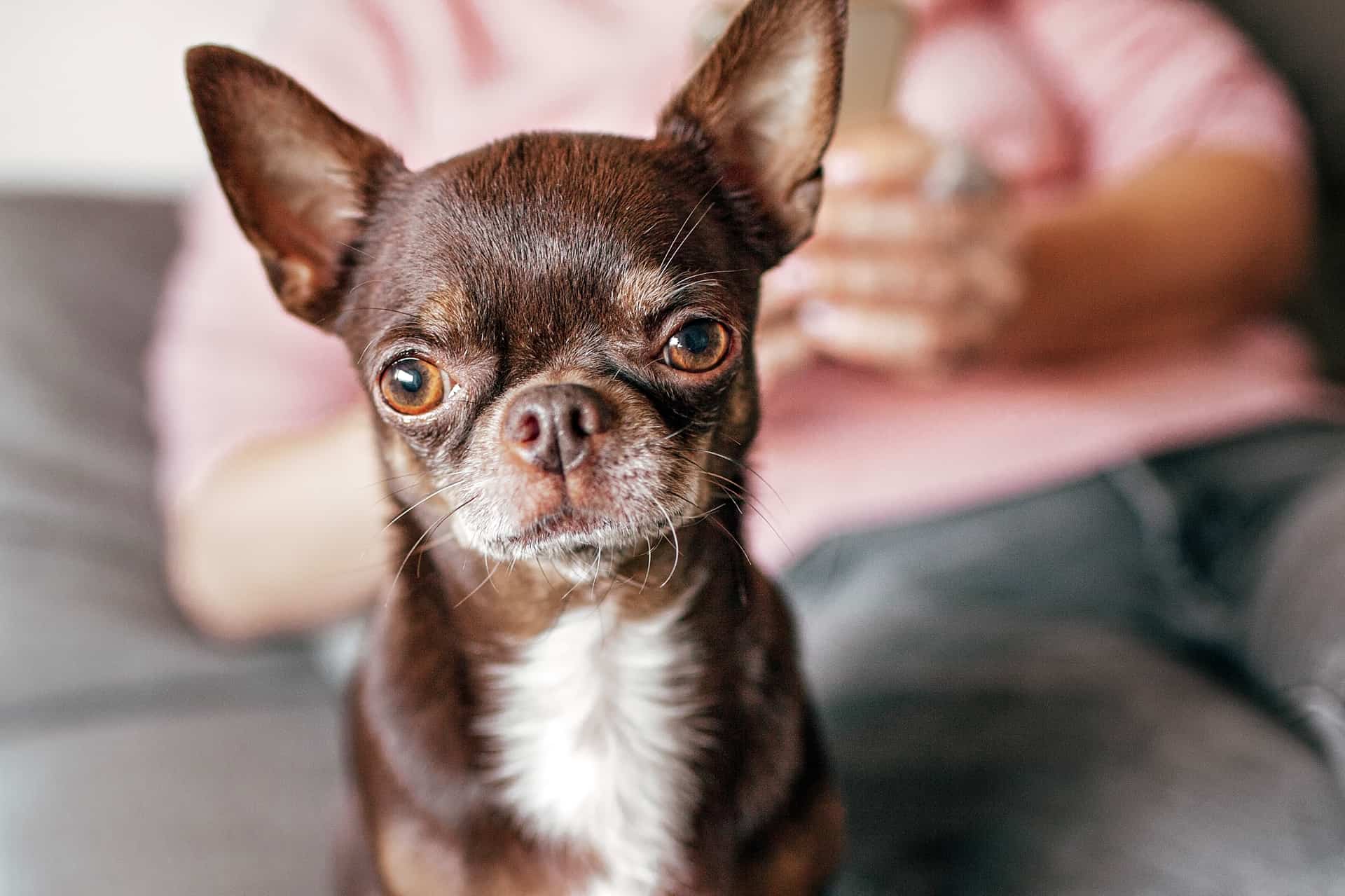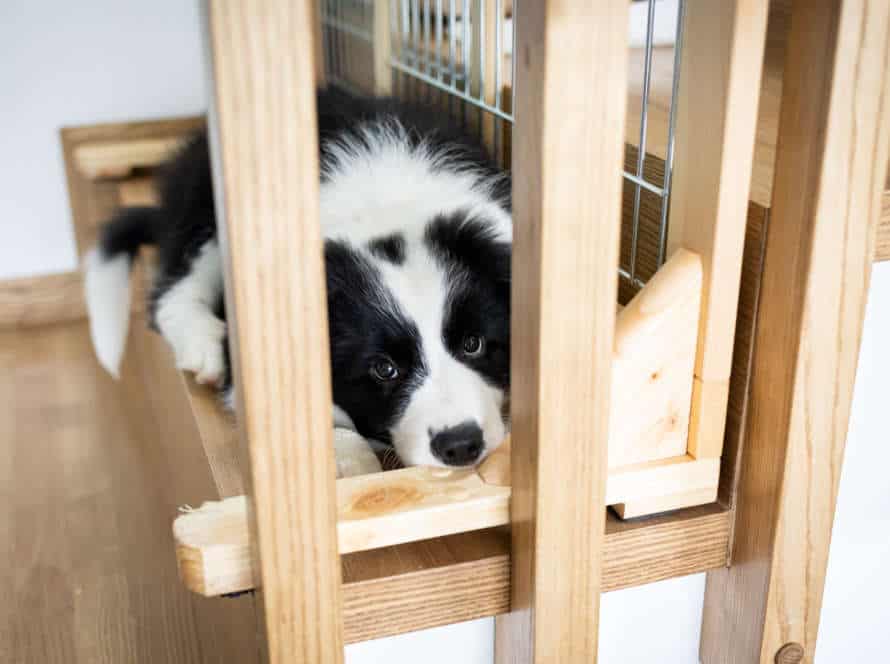How to Handle Nighttime Barking and Whining in Puppies
If your pup is excessively barking or whining at night, there are strategies to help manage this.
Here are some tips:
- Create a consistent bedtime routine which includes wind-down time and potty time.
- Ensure your pup gets enough exercise and activity during the day.
- Ignore the behavior to discourage it.
- White noise machines can comfort pups and drown out external noises that may cause anxiety.
- Positively reinforce calm behavior with rewards or praise.
- If the behavior persists, consult a professional trainer or vet for further guidance.
Remember to be patient and consistent with your approach. With time and training, your pup can learn to sleep soundly through the night.
Understanding Your Puppy’s Barking and Whining
Puppies bark and whine a lot – and that’s ok! Especially in the evening. To figure out why your pup is acting this way, let’s look at some common reasons for nighttime barking and whining. Once you know why, you’ll know how to manage it better.
Why Do Puppies Bark and Whine at Night?
Puppies bark and whine at night, for multiple reasons like unease, worry or seeking attention/food. To address this, one must understand the cause. Here’s how to manage whining and barking in puppies:
- Before bedtime, make sure all the puppy’s needs are met – like feeding, exercising, and potty breaks.
- Make their sleeping place cozy, with a soft bed and blankets or toys.
- Use positive reinforcement techniques to reward good nighttime behavior and reduce barking/whining.
- Don’t give attention to the puppy if they are barking/whining for attention. Comfort them only when they stop making noise.
- Try crate training your puppy, to offer a secure sleeping space.
Barking/whining is normal for puppies. Be patient and consistent while training. With time, your pup will learn to settle down and sleep throughout the night – just like you!
Different Types of Vocalizations and Their Meanings
Puppies have many ways to communicate. Their vocalizations mean different things, depending on the situation. Here are the most common types and what they mean:
- Barking: This is to alert owners of danger or to get attention. Make sure they get enough exercise and stimulation if barking too much.
- Whining: When anxious, scared, or in pain. To help them sleep, make sure they have a comfortable place and have a bedtime routine.
- Howling: To communicate with other dogs or express feelings. They need lots of socialization, and try to avoid triggers that make them howl.
- Growling: A warning that they’re feeling uncomfortable or threatened. Give them space and try to find out why they feel this way.
- Moaning: When relaxed or content. If they moan while being petted, it means they’re happy.
Understanding your pup’s vocalizations will help you respond correctly, plus strengthen your relationship. Tip: Consistent training and positive reinforcement can reduce unwanted barking and whining.
Common Nighttime Triggers for Barking and Whining
Puppies bark and whine a lot. Certain things can make it worse, especially at night. Here are some common triggers:
- Hunger or thirst. Puppies have small tummies and need more meals or drinks.
- Need to pee or poop. They have no control over this.
- Missing their owner. They like attention and may whine when alone.
- Sounds or movements. Unusual noises or motions make them bark.
- Uncomfortable sleeping space. Hot, cold, or noisy places make them unhappy.
Knowing the reasons can help you fix the problem. Tip: Create a nighttime schedule and give your puppy lots of exercise and love during the day. This helps to reduce barking and whining.
Tips for Managing Nighttime Barking and Whining in Puppies
Puppy nighttime barking and whining? Annoying, right? But don’t worry! There are solutions. Give your pup entertainment and a safe, cozy spot to sleep. These practical strategies can make the nights peaceful for all.
Here are some tips to handle nighttime barking and whining in puppies:
- Provide a comfortable and secure sleeping area for your puppy.
- Make sure your puppy gets enough exercise and playtime during the day.
- Stick to a consistent bedtime routine.
- Gently ignore the barking and whining while reinforcing a quiet behavior.
- Avoid rewarding bad behavior with attention or treats.
- Consider crate training, which can provide a sense of security for your puppy.
- Consult with a veterinarian or animal behaviorist if the barking and whining persist.
Establish a Consistent Routine
Creating a dependable routine is key when controlling nighttime barking and whining in puppies. Here are some tips:
- Pick a bedtime for your pup and stick to it. This will help keep their sleep schedule regular.
- Make a soothing bedtime routine with activities like brushing and snuggling. This will tell your pup it’s time for bed.
- Don’t play or do stimulating activities before bed. This’ll just make them more energized and harder to settle down.
- If your pup wakes in the night, don’t rush to them. This can encourage their barking and whining. Wait until they pause before offering comfort.
Remember, forming a consistent routine takes time and patience. So be consistent and trust the process!
Provide Adequate Physical and Mental Stimulation
When it comes to nighttime barking and whining in puppies, providing physical and mental stimulation is essential. Puppies are naturally energetic and inquisitive. If they don’t get enough exercise or playtime during the day, they are more likely to be restless and vocal at night.
Here are some tips to ensure adequate physical and mental stimulation for your furry friend:
- Set up a play area with interactive toys and puzzles to sharpen problem-solving skills.
- Take your puppy for a walk or play fetch for at least 30 minutes daily.
- Give them a comfortable sleeping area with a cozy bed and familiar scents.
- Use positive reinforcement to encourage good behavior and discourage barking and whining.
Don’t forget, a tired and contented puppy is less likely to bark and whine at night. Pro Tip: Consistency is key to managing nighttime barking and whining in puppies. Be patient and stay consistent with your training routine.
Teach the “Quiet” Command and Positive Reinforcement
Teach your pup the “quiet” command and encourage good behavior to manage excessive barking and whining.
To educate your pup the “quiet” command:
- Wait for your pup to bark or whine.
- After the barking or whining stops, say “quiet” in a gentle voice.
- Immediately give your pup a treat and praise for being quiet.
- Regularly repeat the process until your pup realizes that being quiet means a treat.
Recognize and reward your pup for good behavior at night. This can avoid unwanted behavior, such as barking and whining, and support better habits. Be patient with your pup and don’t punish them for unacceptable behavior. Utilize positive reinforcement to help your furry friend comprehend the correct ways to behave.
Managing Separation Anxiety
Managing anxiety in puppies is very important for their health. Nighttime barking and whining can be signs of this anxiety. Here’s how to deal with it:
- Create a nice sleeping space for your pup with a bed and familiar blankets or toys.
- Set up a bedtime routine that includes calming activities like walking and cuddling.
- Gradually increase the distance between you and your pup until they can sleep alone, in a different room.
- Don’t respond to barking or whining with attention or rewards, as this will only make it worse.
- Use calming tools like white noise or aromatherapy to soothe your pup.
- Chat with a vet or an animal behaviorist for extra support and advice.
Consider Using White Noise and Calming Products
When it comes to nighttime barking and whining in puppies, white noise and calming products can be effective. Use a white noise machine or app to mask any outside sounds. There are also calming products, like collars, supplements, and sprays. Consult with your vet to make sure they’re safe and effective. With patience and training, you can help your pup develop better sleep habits and reduce nighttime barking and whining.
Training Techniques for Nighttime Barking and Whining
Puppy owners know too well the exasperation that comes with nighttime barking and whining. But don’t fret, there are easy solutions! Positive reinforcement training and management strategies can help. Here’s a look at the best methods and tools to tackle nocturnal barking and/or whining in puppies.
Crate Training and Gradual Withdrawal Technique
Crate training and gradual withdrawal are two great ways to manage nighttime barking and whining in puppies. Here’s how to use them:
- Crate Training: Get your puppy used to the crate as a safe, comfy spot. Give them treats and toys to reward them for entering the crate. Keep the crate in your bedroom at night, close by, to make them feel secure. Increase the amount of time your pup spends in the crate gradually, never forcing them to stay.
- Gradual Withdrawal Technique: Start by sitting beside the crate until your pup falls asleep. Over several nights, move your chair further away from the crate until you’re out of the room. Respond to any barking or whining only if your pup needs to go potty. Don’t interact with them or take them out to play. Increase the amount of time you wait before responding to help your pup learn to self-soothe.
Remember to be consistent and patient, and always reward the good behaviour.
Co-Sleeping and Bedtime Routines
Co-sleeping and Bedtime Routines can influence a puppy’s nighttime barking and whining. Here are some tips to manage it:
- Stick to a regime. Have a regular bedtime for your puppy. It will give them a feeling of security and reduce their nervousness.
- Gradually separate. Initially sleep near your puppy. Then, move your bed away from theirs.
- Use positive reward. Give treats or compliments when they stay silent during the night.
- Create a secure spot. Offer a crate in which your pup can feel safe. Put their beloved toys and a cozy bed there.
- Ignore. Don’t satisfy your puppy’s need for attention when they bark or yelp.
- Utilize White Noise. A white noise machine can mask external sounds and make your pup’s sleeping better.
Pro Tip: Consistency is essential when you train a puppy. Follow your routine and be tolerant with your furry friend to shape healthy habits and behavior.
Gradual Self-Soothing Techniques
Teaching pups to soothe themselves can help with nighttime barking and whining. Here are some tips:
- Encourage a comfy and secure sleep area, like a crate or bed.
- Give them a warm blanket or toy to cuddle.
- Gradually lengthen bathroom breaks, so they can “hold it” through the night.
- Create a calming bedtime routine: a short walk, massage, or quiet playtime.
- Don’t reward barking or whining with attention.
- If pup wakes up, ignore them to discourage attention-seeking. Let them self-soothe and go back to sleep.
- Be consistent and with time and patience, pup will learn to soothe and sleep through the night.
Reward-Based Training using Treats, Toys and Positive Reinforcement
Reward-based training is a gentle and effective way to curb nighttime barking and whining in puppies. Here’s what you need to do:
- Make your pup’s sleeping area comfy.
- Follow a bedtime routine that includes a final potty break, cuddles and praise.
- Ignore any barking or whining during the night; reward pup when they stop.
- Praise and reward pup in the day for being quiet.
Patience and consistency are key, and positive reinforcement helps build a strong relationship with your pup. Pro tip: Check with a professional dog trainer if you have any worries about your pup’s behavior.
When to Seek Professional Help for Excessive Barking or Anxiety
If your pup’s barking or whining won’t stop, you’ll need expert help. Signs of anxiety, aggression, fear, or fear-based behavior? That’s when you should seek help. Essential, to get your pup back in line!
Signs That Your Puppy Needs Help
As a pup-parent, it’s essential to spot the signs that your furry pal needs expert help. Here are some common ones:
- Excessive barking/whining: Normal for puppies, but too much might show an illness or behavior issue.
- Destructive chewing: Chewing is ok, but if they destroy other stuff it may be anxiety or boredom.
- Aggressive behavior: Puppies may act aggressive when scared, but if it happens often look for help.
- Loss of appetite/energy: No eating or lethargy? It’s time to see a vet.
Pro help can help with training, behavior changes, or medicine. In the meantime, give your pup a calm and supportive environment to ease their anxiety.
Types of Professionals to Consult
Owning a puppy with excessive barking and anxiety can be tough. Knowing who to ask for help is the key. Here are the experts to reach out to when dealing with puppy barking, anxiety, and whining:
- Veterinary behaviorist: They are licensed and board-certified. They can help identify and treat behavior issues in puppies, like anxiety and barking.
- Dog trainer: They can teach you how to train your puppy to stop barking and manage anxiety. Plus, they use positive reinforcement.
- Pet sitter or dog walker: They can give regular exercise and socialization for your pup. This can reduce anxiety and help their sleep schedule.
Pro Tip: Make sure to get help from professionals who have experience and qualifications when it comes to puppy behavior issues.
Treatment Options for Excessive Barking and Anxiety
Excessive barking and anxiety in dogs can be very upsetting. But, there are plenty of treatments out there to help.
First, try to figure out why your pup is acting this way. It could be from not socializing enough, being bored, or fear linked to past events. Deal with the cause directly by introducing new things, more exercise, or getting a vet’s help for medical problems.
If your pup’s barking and anxiety still persist and it’s affecting their life, call in a professional. A vet or trainer can figure out the cause and give treatments, such as meds or behavior change.
Puppies can be tricky when it comes to nighttime barking and whining. But, making their sleeping area comfy and having a bedtime routine can help. Also, ignore their barking and whining during bedtime. This will help them build positive sleep habits.
Last thing: Be patient and consistent when helping your pup. With the right treatment, most dogs show improvement over time.
Conclusion and Recap of Key Concepts
To wrap it up, handling nighttime barking and whining in puppies can be tricky, but with time and reliability, it can be managed. Here’s a reminder of the main points to help you handle nighttime barking and whining in puppies:
- Work out what causes your pup’s conduct.
- Put in place a bedtime routine that includes exercise, a toilet break, and calming activities.
- Make a relaxing sleeping environment for your pup.
- Stop bad behavior by not giving into your pup’s demands.
- Use positive reinforcement techniques to train your pup to sleep through the night calmly.
Keep in mind, it is critical to be patient and consistent in your approach to assist your pup in learning and adapting to a nighttime sleeping pattern.
Sweet Dreams!
Frequently Asked Questions
Q: Why is my puppy barking at night?
A: Puppies may bark at night due to separation anxiety, boredom, fear, or need for attention. It is important to identify the cause before addressing the behavior.
Q: How can I stop my puppy from barking at night?
A: Providing enough physical and mental stimulation during the day, establishing a consistent bedtime routine, and using positive reinforcement training can help reduce excessive barking at night.
Q: Should I ignore my puppy’s nighttime barking?
A: Ignoring a puppy’s nighttime barking may reinforce the behavior. Instead, try redirecting their attention with a toy or treat, or providing calming music or a crate cover to create a comfortable sleeping environment.
Q: Is it normal for my puppy to whine at night?
A: Some degree of whining during the night is normal for puppies, especially during their first few nights in a new home. However, if the whining is excessive or disruptive, intervention may be necessary.
Q: Should I use a bark collar to stop nighttime barking?
A: Bark collars should not be used as the primary method to stop nighttime barking as it can be harmful and may cause more stress for the puppy. Instead, focus on identifying the cause and using positive reinforcement training.
Q: How long does it take to stop nighttime barking in puppies?
A: The amount of time it takes to stop nighttime barking in puppies varies depending on several factors such as the puppy’s age, temperament, and history. Consistency and patience are key when addressing this behavior.







